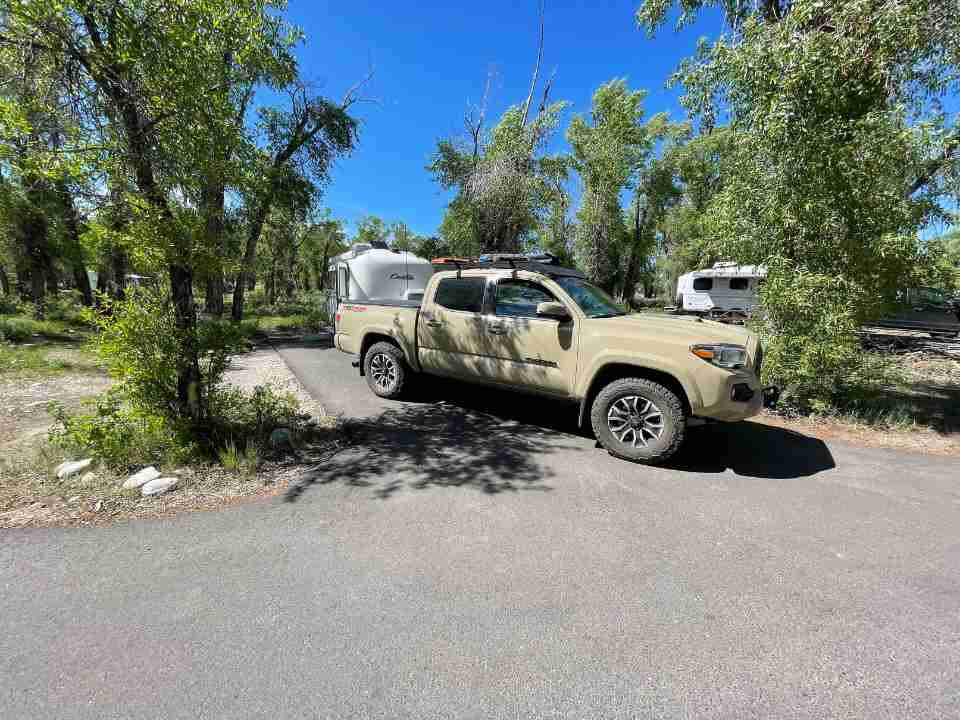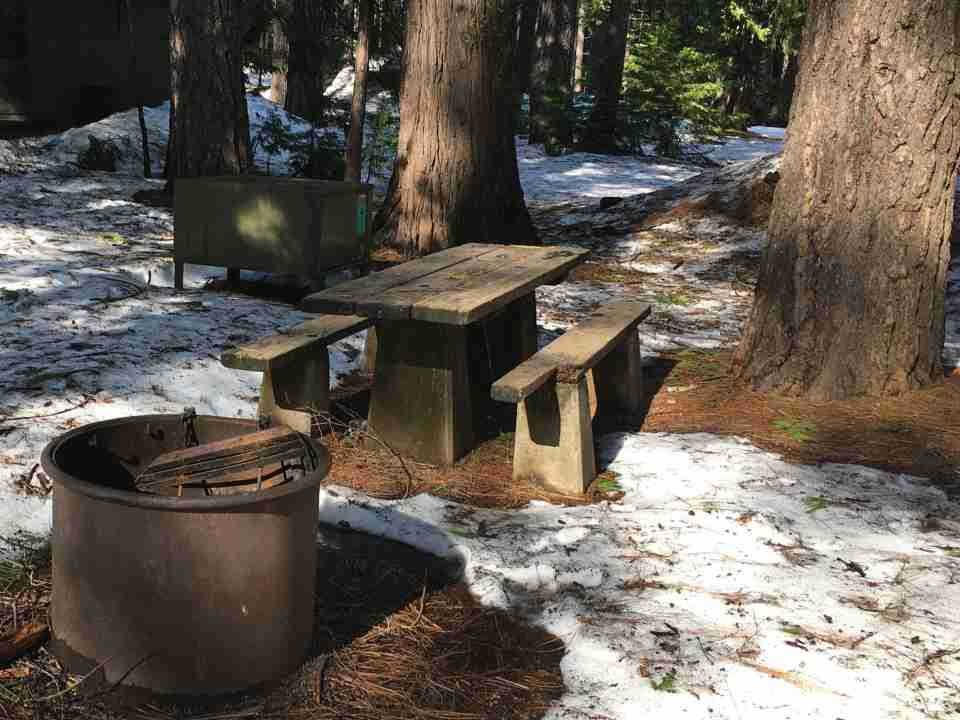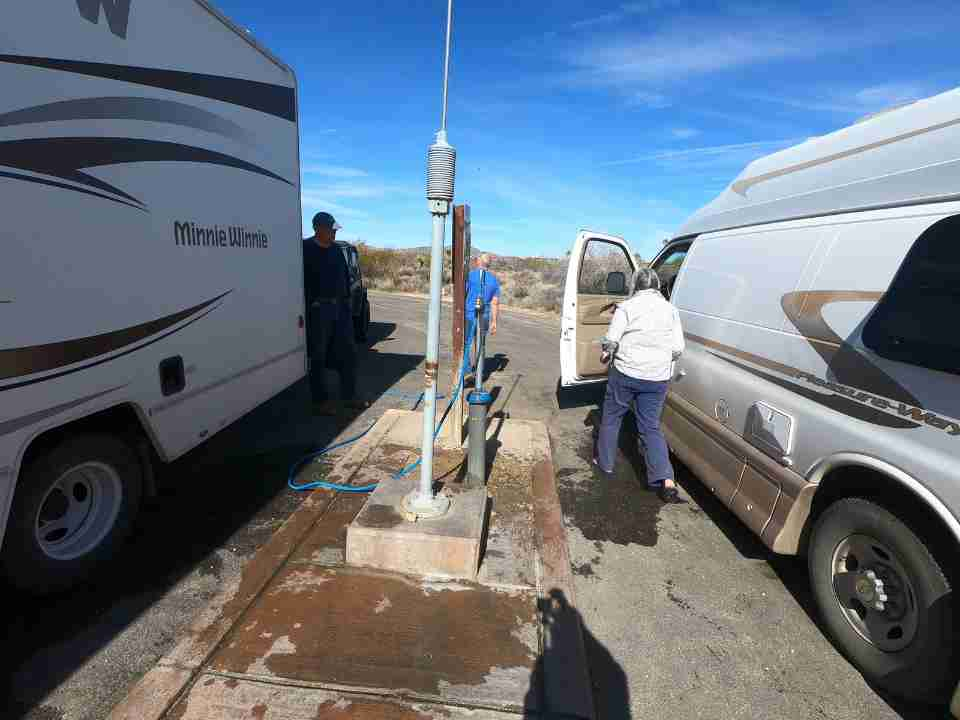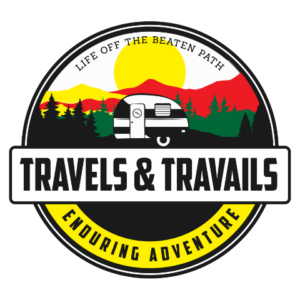
Campgrounds come in literally all shapes and sizes. If you’re going to spend gas and your hard-earned money reaching a campground, you want to ensure that the experience is enjoyable for you and your entire family (or friend group!). Bearing that in mind, what makes for a good campground?
A good campground has these features:
- Easy access to the grounds
- Plenty of space
- Lots of level ground
- A variety of nature
- Outdoor lights and other safety features
- Lodging options
- Basic hookups and dump stations
- Amenities
- Proximity to entertainment
While what one deems a good campground can vary from another person’s opinion, I think most of us can agree that the above traits are all important when selecting an optimal campground for a short-term or longer-term stay. Keep reading for more information to help you choose great campgrounds moving forward!
What Does a Great Campground Have? These Features
Easy Access to the Grounds
Imagine this scenario. You’ve been on the road behind the wheel of your RV for upwards of six or seven hours now. You’re exhausted and can’t wait to take a rest.
You find a campground in the vicinity, but you’ve never stayed there before, so you don’t know what to expect. As you enter the grounds, you’re surprised at how treacherous the path to the campsite is.
You have to go down narrow, bumpy hills with closely-surrounded trees on either side of you. You can hear the branches scraping against the sides of your RV, and it’s truly making you nervous.
Those kinds of experiences can cloud the whole rest of your stay. You’ll worry about what kind of shape your RV is in and if you can drive it.
You’ll also stress about leaving the campground and the damage your motorhome could sustain in the interim. In short, it’s truly no fun.
A good campground, by comparison, should have well-trodden access roads that many vehicles have used before you and many more will use after you. You shouldn’t struggle to get down to the campsite or worry about your RV in the process.
It should all be smooth sailing.
Plenty of Space
When camping in your RV, you’re entitled to a degree of privacy. If you’re literally camping on top of another motorhome because there’s that little space for you and they to park, your camping experience is going to feel tremendously claustrophobic.
You’ll be sensitive about everything you do, even the volume you speak at. After all, if you can hear others in their RV, then you suspect that they can hear you as well.
Even though you’re surrounded by metal walls, you don’t feel like you have much if any privacy. You might as well be camping in a tent.
It shouldn’t be like that! A good campground will afford adequate space for campers to separate themselves from one another by at least several feet.
You won’t feel like you’re invading someone’s privacy or having your privacy invaded, and that’s a truly excellent sensation.
You still won’t want to play loud music or get into a screaming match with your friend or family member, but you can have conversations at normal volume and go about your lives without feeling so self-conscious about it.
Level Ground
You don’t realize how important level ground is until you try camping without it.
Without level ground, it’s difficult to stabilize an RV or travel trailer. You can use all the jacks in the world and you’ll still feel nervous that a strong breeze could send your motorhome careening backward down a hill.
You’ll be afraid to do much of anything in your RV, as you fear that standing on one side of the vehicle versus the other could tip it, as could putting too much gear or equipment.
Not only are there weight distribution issues to stress about, but you should also be concerned about your RV fridge.
While there are all types of motorhome fridges, they all need a series of fluids to run through the refrigeration system to adequately cool your food.
When the fridge is at an angle, the fluid can get stopped up, preventing your fridge from working. You’ll notice that all the cool air is gone, and if the matter persists, your food can even begin to spoil.
The best campgrounds have level ground. The ground may not be completely flat throughout, but in the campsite area especially, you’ll have enough level ground that you can confidently park without issues and use your fridge as well.
A Variety of Nature

Camping is all about ambiance. If it wasn’t, then you could just stay at a hotel and get the same experience (although probably not at the same rate!)
Admittedly, any outdoor campsite is going to be surrounded by nature, but that doesn’t mean that all nature is created equally.
For example, if it’s just tree after tree after tree, then visually, that can get a little bit boring. Ideally, your campground should have creeks, trees, rocks, rivers, lakes, streams, or even waterfalls to give you plenty of visual interest points to drink in.
The quality of nature is also incredibly important. For example, are the trees healthy? There are plenty of ways to tell, especially if you’re willing to get a little closer to the tree to check.
If the trees have evidence of an insect invasion or if you can see an active insect invasion, that’s a bad sign. The same is true if the leaves are holey, most branches don’t have leaves (and it’s not autumn), and many of the branches have snapped.
Are there bare patches across the trees? Maybe you see holes, cracks, or cavities in the limbs or the tree trunk?
This tree and any surrounding tree with the same symptoms are not healthy. Using the tree for any reason, such as setting up a tent or a hammock for daytime lounging is not advisable since the branches could snap.
You also don’t want to park too close to diseased or damaged trees. All it can take is one good wind to uproot the dying tree and it will fall right on your RV!
Listen, trees are going to succumb to death or disease at times, that’s inevitable. However, if the campground has more unhealthy trees than it does healthy ones, then this is not a place you want to stay.
Outdoor Lights and Other Safety Features
Your safety is paramount when camping. Even if your RV doors lock up tight, that doesn’t necessarily stop someone nefarious if they wanted to break in.
For example, a criminal could smash your windows or look for other vulnerabilities in your motorhome and use those as access points to get in.
Murders in national parks and campgrounds do happen, which is something I’ve talked about on the blog. So too do disappearances and assaults.
Unfortunately, because so many parks and campgrounds are surrounded by big, vast expanses of wilderness, a lot of these crimes go unsolved, leaving loved ones with no sense of closure.
I’m not trying to scare you, but you should always be aware of all the risks when camping. Unfortunately, those risks don’t come solely from wild animals, but from mankind as well.
To this end, safety features at a campsite can really make a big difference. Outdoor lighting dotted across the grounds will prevent troublesome parties from slinking around in the full cover of darkness.
Upscale campgrounds might offer security gates. Other security features you might spot at various campgrounds include surveillance cameras and perimeter fencing.
Campground staff might even patrol the grounds every night to ensure that everyone is in their vehicle or tent and that no one is seeking to cause trouble.
Lodging Options
You own an RV, so you always have a reliable lodging option available, but not everyone who comes through a campground does. For these parties, lodging options are important.
When researching campgrounds, a wealth of lodging options is best. Guests should be able to stay at cabins and cottages, maybe even a yurt depending on where the campground is located.
Of course, none of these additional lodging options are free, but nonetheless, they’re there, giving more campers the option to stay comfortably.
Basic Hookups and Dump Stations

Nothing is worse than when you had been counting on a campground to restore water or electricity to your RV, then you get there and find out they don’t have hookups. That’s right, no hookups whatsoever, despite what was advertised on their website.
You can feel hoodwinked in a scenario like that, and crestfallen as well. Now you’ll have to boondock in the dark. You can make it work, but it’s not what you had anticipated since you had thought you’d have hookup access.
A good campground should afford any interested campers basic hookups like freshwater and electricity. More so, the allotment of water and electricity should be generous enough that each visitor feels like they’re getting their fair share.
That’s not to say you can pull on the campground’s water and electricity supplies infinitely, but you can refill your freshwater tank and enjoy a few hours of electricity before bedtime, at least.
It’s also best if a campground has a dump station on its grounds or within the vicinity. Your blackwater and graywater tanks are going to get full, and without a designated place to dump them, you can be put in a tough spot.
The most dutiful of campers will wait to dump, but they might cut their stay at the campground short because their tanks are overfull. More dubious campers might be encouraged to dump in areas they shouldn’t.
That can affect the wildlife and greenery in the area, not to mention that dumping outside of a dump station impacts everyone’s enjoyment. What you’re dumping from your graywater and blackwater tanks is waste, including bathroom waste.
The smell is going to spread everywhere, and the mess is not an appealing sight either. People could end up complaining or even leaving the campground.
Amenities
Dump stations and hookups are great, but those aren’t the only amenities that a good campground should offer.
As I talked about earlier, lodging is certainly a sought-after amenity. Paying customers will also appreciate access to showers and toilets, refrigeration, lights, and comfy beds.
Those who are staying in a tent or RV are entitled to amenities too. They won’t be to the same plush degree as those amenities listed above, but you might be able to use firepits or fire circles, communal grills, communal bathrooms (perhaps even with a shower!), clean drinking water stations, and bear-safe garbage disposal and food storage.
RV clubs usually take it a step further, offering such entertainment as sports courts, games for the kiddos, nightly movie airings on projector screens, live music, hayrides, and even stargazing tours.
If you like to travel with your pets, a pet-friendly campground is a must!
Proximity to Entertainment
How close your campground is to entertainment is also a huge determining factor of its quality.
Does the campground have hiking trails, bike paths, and other daily entertainment options on the grounds? For instance, you could go canoeing or kayaking, play a game on a sports court, fish, go horseback riding, do some bird-watching, or swim in a lake or river.
If these kinds of entertainment options aren’t offered at the campground itself, then how far do you have to go to find something fun to do?
The further you have to travel, the more inconvenient, which could turn you off from wanting to stay at that campground.
Conclusion
What separates a good campground from a bad one? The best campgrounds have amenities, outdoor entertainment options, hookups, dump stations, and excellent security. They also feature easy entrance and exit points, lots of space for campers, and level ground.
If you’re wondering if a campground you found is good or not, before you spend the time staying there and risk possibly having a bad time, why not read the reviews online? Those will shed some light as to what kind of camping experience you can expect!
